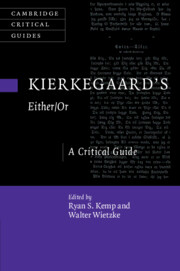Book contents
- Kierkegaard’s Either/Or
- Cambridge Critical Guides
- Kierkegaard’s Either/Or
- Copyright page
- Contents
- Contributors
- Acknowledgments
- Abbreviations
- Introduction
- Chapter 1 Existential Melancholia
- Chapter 2 Don Giovanni and the Musical-Erotic
- Chapter 3 For What May the Aesthete Hope?
- Chapter 4 Companions in Guilt
- Chapter 5 A’s Religion of Boredom
- Chapter 6 The Artist Is Not Present
- Chapter 7 Failed Temporalities in Either/Or
- Chapter 8 Love, Marriage, and Delusion in Either/Or
- Chapter 9 The Philosophy of Science in Either/Or
- Chapter 10 The Despair of Judge William
- Chapter 11 The Problem of Evil in Either/Or
- Chapter 12 Illusions of Ethical Independence
- References
- Index
- Cambridge Critical Guides
Chapter 7 - Failed Temporalities in Either/Or
Published online by Cambridge University Press: 16 November 2023
- Kierkegaard’s Either/Or
- Cambridge Critical Guides
- Kierkegaard’s Either/Or
- Copyright page
- Contents
- Contributors
- Acknowledgments
- Abbreviations
- Introduction
- Chapter 1 Existential Melancholia
- Chapter 2 Don Giovanni and the Musical-Erotic
- Chapter 3 For What May the Aesthete Hope?
- Chapter 4 Companions in Guilt
- Chapter 5 A’s Religion of Boredom
- Chapter 6 The Artist Is Not Present
- Chapter 7 Failed Temporalities in Either/Or
- Chapter 8 Love, Marriage, and Delusion in Either/Or
- Chapter 9 The Philosophy of Science in Either/Or
- Chapter 10 The Despair of Judge William
- Chapter 11 The Problem of Evil in Either/Or
- Chapter 12 Illusions of Ethical Independence
- References
- Index
- Cambridge Critical Guides
Summary
Time, and how we relate to it, is a persistent theme throughout Kierkegaard’s writings. Particularly striking is the way in which Kierkegaard depicts various pathologies of temporal experience, showing how various strategies for dealing with time are ultimately self-defeating. Either/Or is perhaps the single best example of a text in which Kierkegaard problematizes time and our responses to it. The book is famously presented as staging a clash between two views of life, the aesthetic and the ethical. But it can also be understood as presenting and critiquing two different ways of relating to time: one that tries to evade the responsibility entailed by living in time and one that tries to anchor itself in an eternity that is ultimately a denial of finitude. The text suggests both approaches to time are doomed, and that a different, specifically religious relation to time is required.
- Type
- Chapter
- Information
- Kierkegaard's Either/OrA Critical Guide, pp. 116 - 134Publisher: Cambridge University PressPrint publication year: 2023

